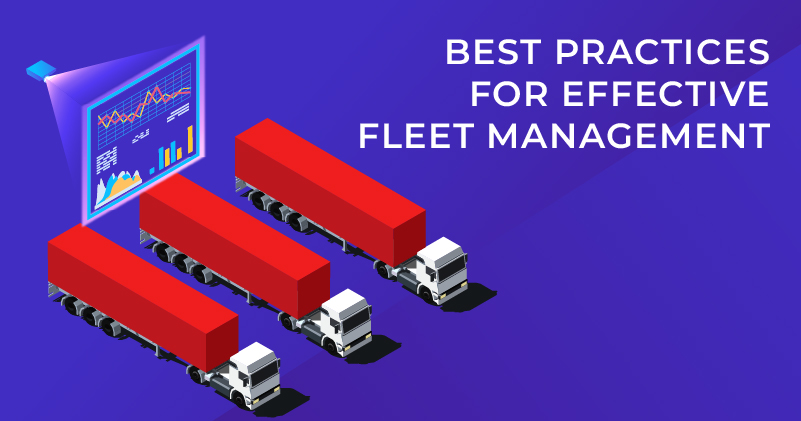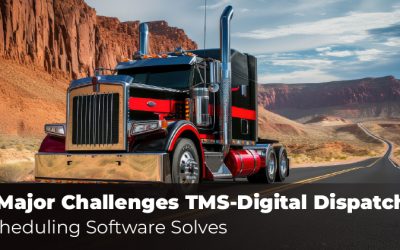
Effective fleet management is crucial in optimizing operations, reducing costs, and ensuring the smooth functioning of transportation logistics. Whether it’s a small fleet of vehicles or a large-scale operation, implementing best practices in fleet management can significantly improve overall efficiency and profitability.
Managing a fleet of vehicles is a challenging task. It involves juggling various aspects like vehicle maintenance, driver management, fuel consumption, and data analysis. Effective fleet management is crucial for streamlining operations, controlling costs, and ensuring smooth transportation logistics.
In this blog post, we’ll explore the importance of best practices for effective fleet management, its challenges, and the best practices you can implement to optimize your fleet and drive success for your business.
So, let’s dive in and discover the essential strategies and approaches that can revolutionize fleet management and drive success for your organization.
-
Fleet Planning and Optimization
One key aspect of efficient fleet management is planning and optimization. It starts with estimating the right fleet size based on your business requirements. You can avoid having too many or too few vehicles in your fleet by carefully analyzing your transportation needs, such as delivery volume and peak demand periods.
To further enhance efficiency, fleet management software comes into play. Utilizing advanced software for route optimization helps you plan the most efficient delivery routes, taking factors like traffic patterns, delivery time windows, and vehicle capacities into account. This saves on mileage and reduces fuel consumption and wear and tear on your vehicles.
Efficient scheduling and dispatching strategies are also vital. You can allocate resources effectively by developing streamlined processes, ensuring timely deliveries, and minimizing idle time. Real-time monitoring through telematics and GPS tracking enables you to monitor your fleet, promptly address any deviations or delays, and make informed dispatch decisions based on vehicle availability and proximity to destinations.
-
Fleet Maintenance and Safety
Maintaining your fleet in top condition is essential for smooth operations and preventing unexpected breakdowns. Regular vehicle inspections and adhering to maintenance schedules help identify and address issues before they escalate. Implementing preventive maintenance practices allows you to stay proactive and minimize the chances of costly breakdowns.
Safety is paramount in fleet management. Ensuring compliance with safety regulations and providing driver training programs are crucial for driver and road safety. By utilizing telematics systems, you can monitor vehicle health and driver behavior in real time. This helps you identify potential issues, promote safer driving habits, and improve fleet safety.
-
Fuel Management
Managing fuel consumption effectively is another critical aspect of fleet management. Monitoring fuel consumption and promoting fuel-efficient driving techniques can significantly reduce costs. Tracking fuel expenses and identifying cost-saving opportunities, such as inefficient routes or excessive idling, helps you make smarter fuel-related decisions. Implementing a fuel card system provides better control and tracking of fuel purchases, streamlining fuel management processes.
-
 Driver Management and Performance
Driver Management and Performance
Your drivers play a vital role in fleet management. Hiring and training qualified drivers are essential for ensuring that skilled professionals are behind the wheel. Monitoring driver performance and behavior helps identify areas for improvement and provide constructive feedback. Implementing driver incentive programs boosts motivation and retention, fostering a positive work environment. Compliance with hours-of-service regulations is critical to prevent fatigue-related accidents and ensure regulatory compliance.
-
Data Analytics and Reporting
Leveraging data analytics is critical to optimizing fleet management. Utilizing fleet management software for data collection and analysis lets you gather valuable insights into fuel consumption, maintenance records, and driver behavior. Generating comprehensive reports on key performance indicators (KPIs) such as fuel efficiency, maintenance costs, and on-time deliveries provides a clear snapshot of your fleet’s performance. Using these insights, you can make informed decisions and fine-tune your operations for better efficiency.
-
Fleet Replacement and Asset Lifecycle Management
As your fleet ages, evaluating the lifespan and cost of maintaining older vehicles becomes crucial. Developing a fleet replacement strategy based on depreciation and ROI analysis helps you decide when to replace aging vehicles. Adopting asset lifecycle management practices optimizes vehicle lifespan, reduces maintenance costs, and ensures reliable performance.
Conclusion
Effective fleet management is vital for optimizing transportation operations, reducing costs, and improving customer satisfaction.
By implementing best practices in fleet planning and optimization, maintenance and safety, fuel management, driver management, data analytics, and asset lifecycle management, you can unlock the full potential of your fleet. Embrace these practices, leverage technology, and make data-driven decisions to propel your fleet toward success in the transportation industry.
If you’re looking for a reliable partner to assist you in implementing these best practices, TMS Digital is here to help. As the top provider of fleet and trucking software solutions in the US, we offer cutting-edge technology and expertise to streamline your fleet management processes. Our comprehensive TMS software empowers you with features like route optimization, real-time monitoring, driver management, and robust analytics capabilities.
Take the first step towards optimizing your fleet by implementing these best practices and partnering with TMS Digital. Contact us for a consultation and unlock the full potential of your fleet with our industry-leading software solutions. Let’s revolutionize your fleet management together!









